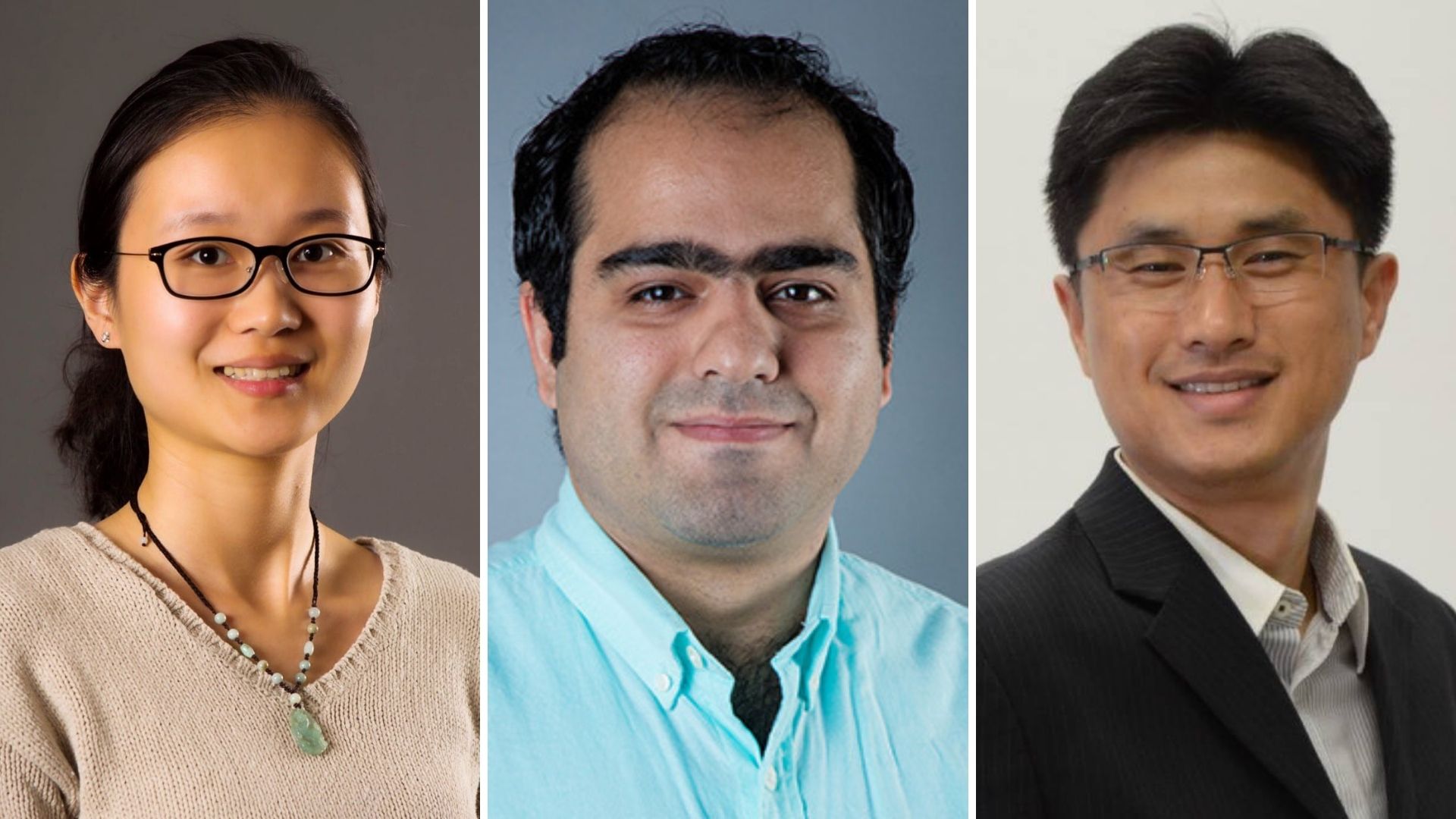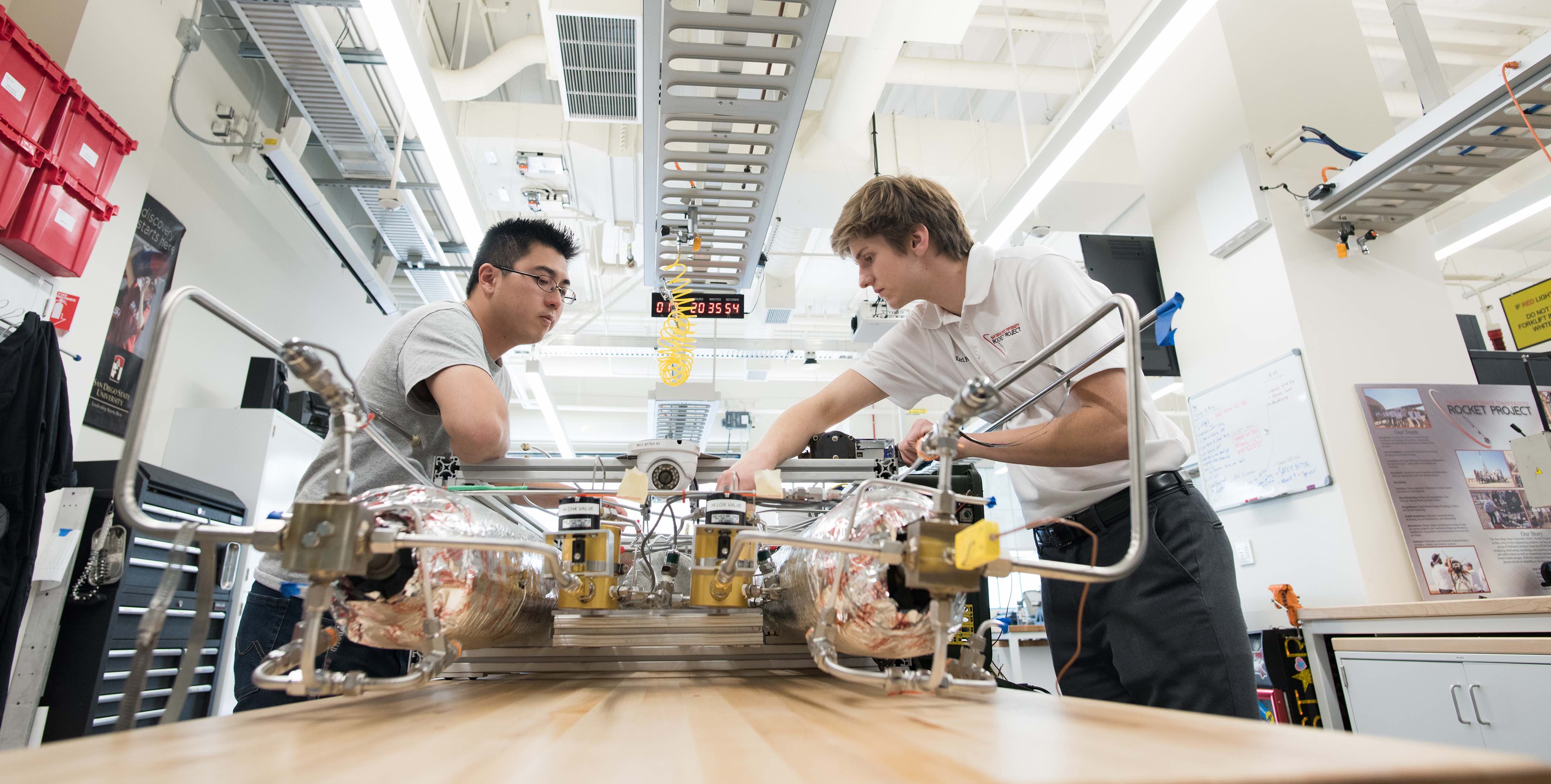Three SDSU Engineering Faculty Earn NSF CAREER Awards

Three SDSU Engineering CAREER Grant Awardees (L-R): Junfei Xie, Reza Akhavian, Sung-Yong (Sean) Park.
The National Science Foundation (NSF) Early Career Development program has awarded CAREER grants to three San Diego State University College of Engineering junior faculty members for research on computational drones, human-robot interactions and indoor solar lighting energy. CAREER grant recipients are selected for their potential as academic role models in research and education and to lead advances in the mission of their institution.
Junfei Xie
Junfei Xie’s electrical & computer engineering research centers on airborne networks formed by drones with direct flight-to-flight communication links. Her research further opens the door to possibilities of artificial intelligence (AI) being integrated into drone systems.
The CAREER award supplies Xie with $550,000 in funding over the course of five years to study algorithms to improve the efficiency, resilience, scalability and safety of dynamic systems and networks. Ultimately, Xie aims to advance drone technology by developing a system for drones to have networked airborne computing capability: “Drone technology is far from mature and there are many research questions that remain to be answered in order to develop the potential of drones to the full extent.” The full extent of drone use includes future capabilities such as crowd control at large events, aerial traffic monitoring, and even emergency response settings.
Along with fully funding student researchers in Xie’s SMILE lab, the award will also fund innovative education and outreach activities such as virtual lab modules, summer camps and internships for the greater San Diego, with an emphasis on bringing these educational opportunities to underrepresented groups in STEM. Xie shares, “The workshops and tutorials will further broaden the impact of this project and benefit the general public.” Read the full article about Xie's award in SDSU News Center.
Reza Akhavian
Reza Akhavian studies construction robotics and human-robot interactions in construction zones. His research centers on taking the traditional nature of the construction industry through human-centered automation involving a network of sensors for collaborative robots (co-robots) to adapt their movements with the workers and vice versa.
The CAREER grant brings Akhavian $691,000 in funding over five years to support his research and education program on ways to promote worker safety and efficiency in construction job sites by improving worker-robot interactions. Through his research, collaborative robots will learn from and assist construction workers so that workers can focus on less strenuous physical work and more on higher-level planning and improvisation tasks.
Ahkavian aims for this award to benefit female construction engineers, who currently make up only 9% of the construction workforce: “We want to change this perception that fieldwork is only a man’s job and show that there is ample opportunity in the industry for women to build their careers. Technology is one way to change this narrative; for example by delegating heavy work to robots, we have a golden opportunity to broaden the participation of all groups in construction.” Read the full article about Akhavian's award in SDSU News Center.
Sung-Yong (Sean) Park
A mechanical engineer, Sung-Yong (Sean) Park works on indoor optofluidic solar power technologies, concentrated solar energy, solar indoor lighting, and solar spectrum splitting.
Park’s research has earned him $500,000 in funding over five years from NSF to develop a novel optofluidic lighting (OFSIL) approach to that uses rooftop solar energy and excess sunlight to illuminate the inside of buildings with active control of lighting power as well as for also for other indoor solar activities such as indoor farming.
With the building sector accounting for more than 70% of all U.S. electricity use and 40% of total U.S. energy consumption, Park says that this solar-powered lighting will support the need for more environmentally-friendly buildings: “As society has developed, electric lighting has rapidly become one third of buildings’ energy consumption, so ideally why not use the sunlight - especially in California where the sun is very strong - for indoor lighting?”
Along with research outreach activities that will be conducted with the goal of promoting participation of underrepresented groups in STEM disciplines, the technology developed in this research can be further used for other underground structures, such as subways and underground tunnels, where natural sunlight can be enjoyed for indoor lighting and even make possible the cultivation of plants in deep underground structures. Read the full article about Park's award in SDSU News Center.
San Diego State University College of Engineering
Since 1961, the SDSU College of Engineering has excelled in providing the resources and education necessary for faculty to advance their research and for students to receive the highest caliber of an engineering education. The amount of research funds awarded to our College faculty has quadrupled during the last seven years and is at its historical maximum. All departments in the College are in the Top 25 for generating engineering workforce in the US.

